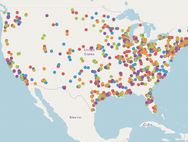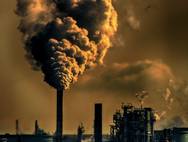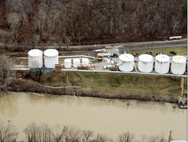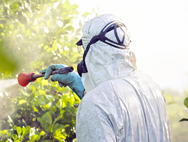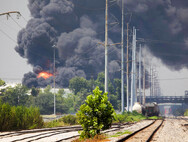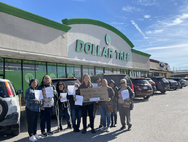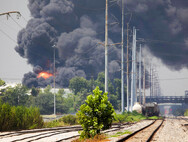Content Archive
Year
October 21, 2025
Los EE. UU. importan un herbicida tóxico atado al mal de Parkinson de países que prohíben su uso.
Un nuevo informe revela que los EE. UU. importan decenas de millones de toneladas de paraquat anualmente de China y el Reino Unido, ambos países que han prohibido el uso del plaguicida debido a preocupaciones por el riesgo a la salud y seguridad. Récords comerciales muestran que las importaciones estadounidenses de paraquat han aumentado esta década, aún cuando más de 70 países alrededor del mundo prohíben su uso. La exposición al paraquat se ha atado al mal de Parkinson, cáncer de la tiroide, daño pulmonar y otras condiciones de salud serias. El informe incluye testimonios de campesinos que probablemente fueron expuestos al paraquat en granjas estadounidenses y quienes luego desarrollaron quemazón debilitante de la piel, el mal de Parkinson y daño pulmonar. “Hasta recientemente, no sabía que mi papá probablemente adquirió el mal de Parkinson por sus años de trabajo en los campos de algodón, donde probablemente se usaba el paraquat,” dijo Mirna, miembro de la Alianza Nacional de Campesinas, cuyo padre era campesino en California y falleció por complicaciones del mal de Parkinson. “El gobierno tiene que reconocer el impacto de usar estos químicos porque afectan el ambiente y la salud de nuestra comunidad.”
Read MoreOctober 21, 2025
U.S. imports a toxic herbicide linked to Parkinson’s disease from countries that ban its use
A new report reveals that the U.S. imports tens of millions of tons of paraquat a year from China and the United Kingdom, countries that have both banned the pesticide due to health and safety concerns. Trade records show that U.S. paraquat imports have increased this decade, even as over 70 countries worldwide prohibit its use. Paraquat exposure has been linked to Parkinson’s disease, thyroid cancer, lung damage, and other serious health conditions. “Corporate greed and weak U.S. pesticide regulations are driving a health crisis for farmworkers, farmers and rural communities. Foreign-owned agrochemical companies are profiting while our essential farming communities suffer,” said Judy Robinson, Executive Director of Coming Clean.
Read MoreOctober 21, 2025
Paraquat imports climb despite concerns about health impacts
The US has been importing increasing amounts of paraquat, a pesticide widely used in farming that is linked to Parkinson’s disease, even as other countries have banned the chemical amid growing concerns about risks to human and environmental health, according to the findings of a new report. The report cites multiple Chinese factories as supplying paraquat to the US in recent years but singles out Sinochem Holdings, a Chinese government-owned company and parent to paraquat maker Syngenta, as among the key suppliers by way of a Syngenta manufacturing facility in central England. Sales in the US are “helping to prop up demand for a toxic product with a shrinking global market,” the report states. “I hope this research shows that giant, foreign-owned companies are the ones profiting from weak US pesticide regulations,” said Deidre Nelms, spokeswoman for Coming Clean and author of Tuesday’s report.“These companies can’t be trusted to solve the health and environmental problems they had a hand in creating in the first place,” she said. “Farming without pesticides is the only viable way to protect the health of the people who grow and harvest our food.”
Read MoreOctober 14, 2025
We're hiring an EJHA Administrative Associate
Coming Clean is seeking part-time, short-term administrative support for the Environmental Justice Health Alliance for Chemical Policy Reform (EJHA). The EJHA Administrative Associate will report to, and take direction from the EJHA National Organizer.
Read MoreOctober 9, 2025
Trump Is Using the Shutdown to Supercharge His War on Equity
As the federal government shutdown stretches into its second week, President Donald Trump is targeting nearly $30 billion in cuts to federal funding almost exclusively to Democratic states and cities. The impact of the cuts to public transit, energy projects, and fundamental civil rights programs could carry far-reaching harms across the nation and the economy. The cuts are the next step in the implementation of executive orders issued by Trump that strive to eradicate policies that advance racial and gender equity, tackle the climate crisis, and threaten the fossil fuel industry. "When the Biden-Harris administration came in, they did not just create plans in a vacuum, they went and listened to people in the community” to learn what projects were needed, “and financing flowed from those discussions,” Michele Roberts of the Environmental Justice Health Alliance. The programs included projects to address historic and ongoing environmental racism and injustices, and the disproportionate health and economic burdens in Black and Brown communities that followed.
September 18, 2025
Chemical Incident Tracker updated after EPA deletes data
The Coalition to Prevent Chemical Disasters published updates to its open-access chemical disaster tracking tool today that allow users to see how close they live to highly hazardous facilities covered by the U.S. Environmental Protection Agency’s (EPA) Risk Management Program (RMP). The Chemical Incident Tracker continues to allow users to search for chemical releases, fires and explosions that have been reported in the media since January 2021, using an interactive map. The tracker is updated with new incidents weekly.
Read MoreSeptember 9, 2025
Polluter free passes show Trump Administration’s indifference to community health
Exposure to chemical plant pollution can shorten lives and contribute to many health problems. Last year, the U.S. Environmental Protection Agency (EPA) finally took action to reduce emissions of cancer-causing toxics like ethylene oxide and chloroprene from chemical plants, and developmentally-toxic mercury and heavy metals from coal plants. President Trump’s proclamations give over 150 facilities (52 chemical plants, 39 sterilizers and 68 of the country’s dirtiest coal plants) a free pass to ignore these pollution-reducing rules that would otherwise protect lives and health.
Read MoreAugust 28, 2025
Environmental Groups Sue EPA Demanding Protections from Hazardous Chemicals
A coalition led by environmental justice organizations filed a suit against the U.S. Environmental Protection Agency today for refusing to issue long-overdue rules to prevent hazardous-substance discharges that threaten public health and contaminate waterways. Across the United States, more than 100,000 facilities make, store, or use hundreds of hazardous chemicals linked to reproductive, developmental, and neurological harm – including benzene, hydrogen sulfide, sulfuric acid, hydrogen cyanide, and hydrochloric acid. “For generations environmental justice communities have lived next to some of the most hazardous facilities in the country that threaten the bodies of water our families rely on to survive. Now more than ever we must prioritize creating safe and healthy places where all of our children can thrive and grow.” said Michele Roberts, National Coordinator of the Environmental Justice Health Alliance for Chemical Policy Reform. “The EPA’s do-nothing approach leaves us one incident away from a catastrophe.”
Read More
August 25, 2025
Broad Coalition Calls on Congress To Reject Fast-Moving Legislation To Shield Chemical Companies from Liability
Legislative language moving through Congress, intended to prevent farmers, consumers, and workers from holding pesticide manufacturers accountable for the harm caused by their toxic products, is being opposed by a broad coalition of farmers, beekeepers, consumers, environmentalists, and workers, with the release of a joint statement opposing a dramatic change in a fundamental legal right. The document, Protect the Right of Farmers, Consumers, and Workers to Hold Pesticide Companies Accountable for Their Harmful Products, is joined by 51 organizations, coalitions, businesses, and leaders representing tens of thousands of members and communities. The legislation is hidden in a provision of the Appropriations bill (Section 453) that has passed through the Appropriations Committee in the U.S. House of Representatives, which is headed for a vote in the full House, followed by the U.S. Senate.
Read MoreAugust 13, 2025
Before A Steel Plant Exploded, Trump’s EPA Hid Risks From The Public
he U.S. Steel plant where two workers were killed and 10 injured in an explosion on Monday had a history of chemical accidents — but it was one of hundreds of high-risk chemical facilities that were recently hidden from the public after demands from the chemical industry. The Trump administration, at the behest of the powerful chemical lobby, has been working to gut oversight of so-called Risk Management Program facilities, chemical plants that are considered at the highest risk of deadly explosions. In April, two months after an explicit request from industry, Trump’s Environmental Protection Agency (EPA) scrubbed a tracking tool listing such facilities from its website. “This isn’t U.S. Steel Clairton Coke Works’ first incident,” Maya Nye, the federal policy director of Coming Clean, a chemical watchdog group, told The Lever. “Any time the same facility has repeated disasters, that’s a regulatory failure.”
Read MoreAugust 5, 2025
Trump gives Louisville plant more time to address pollution. Homes sit 500 feet away
Bakelite Synthetics, the only major source of formaldehyde emissions in Jefferson County, will have more time to comply with Biden-era pollution control requirements following a Trump proclamation. The plant neighbors the Riverside Gardens community, where residents have raised concerns about chemical emissions and other hazards in the past. "This would be the perfect time for this city to strengthen that permit in an effort to reduce our exposure to any of the chemicals coming from Bakelite," Eboni Cochran, a longtime environmental justice advocate with Rubbertown Emergency ACTion, or REACT, said in a text message. "There are solutions," Cochran said. "The city just needs to have enough will and courage to protect its residents."
Read MoreAugust 4, 2025
U.S environmental health is under attack
Living in a healthy environment means that you can trust that your basic living conditions – air, water, food, shelter, and the things in your built world – will not make you sick. Living in a healthy environment means that, no matter your identity, you trust the safety of public spaces, and do not fear bodily harm in your home, workplace, or street. The Trump Administration is systematically dismantling the conditions of a healthy and safe environment.
Read MoreJuly 17, 2025
Environmental Health, Fenceline and Labor Organizations Call for Preservation of Chemical Safety Board
Today, Coming Clean, the Environmental Justice Health Alliance, and other members of the Coalition to Prevent Chemical Disasters sent a letter urging members of Congress to oppose White House proposal to eliminate the U.S. Chemical Safety and Hazard Investigation Board (CSB). The CSB is an independent nonregulatory federal agency that Congress created pursuant to federal law after deadly chemical disasters in Bhopal, India and Institute, West Virginia. It is the only federal agency charged with investigating the root causes of industrial chemical disasters; issuing reports to Congress, EPA, and OSHA; and making recommendations to prevent future disasters. This year alone, there have already been over one hundred chemical incidents in the U.S
Read MoreJune 16, 2025
Trump quietly shutters the only federal agency that investigates industrial chemical explosions
Eliminating the CSB will come at a cost to the safety of plant workers and neighboring communities, especially along the Gulf Coast, where the bulk of the U.S. petrochemical industry is concentrated, said former CSB officials and environmental groups. “Closing the CSB will mean more accidents at chemical plants, more explosions and more deaths,” said Beth Rosenberg, a public health expert who served on the CSB board from 2013 to 2014. On average, hazardous chemical accidents happen once every other day in the U.S., according to Coming Clean, an environmental health nonprofit. Coming Clean documented 825 fires, leaks and other chemical-related incidents between January 2021 and October 2023. The incidents killed at least 43 people and triggered evacuation orders and advisories in nearly 200 communities.
Read MoreMay 8, 2025
Year-long study reveals toxic chemicals in popular dollar store products
A new year-long study from the Campaign for Healthier Solutions (CHS) claims that many popular products found at the biggest dollar store chains across the country contain toxic chemicals. The report showed that nearly 50 personal care, baby, beauty, and cleaning products were found to have toxic chemicals. Many of these products were kids’ toys or baby products, which raises concerns for parents – especially parents of young kids, who often put things in their mouths."Busy parents shouldn't have to scan the ingredients list of every product they buy to make sure it's safe for our families,” Yolanda Brown Alston, director of workforce programs at Harambee House, said in a news release. “Dollar stores need to step up on chemical safety and provide quality products that add value to our communities.”
Read MoreMay 7, 2025
Las pruebas impulsadas por la comunidad nuevamente revelan sustancias químicas preocupantes en los productos de las tiendas del dólar
La Campaña para Soluciones más Saludables / Campaign for Healthier Solutions (CHS, por sus siglas en inglés) publicó hoy los resultados del esfuerzo de todo un año para recopilar, analizar y examinar los productos de las tiendas del dólar en busca de sustancias químicas preocupantes. Los productos preocupantes resaltados que se compraron en Dollar Tree/Family Dollar y/o Dollar General incluyen: Loción para bebé “Baby Shark” que contiene un químico liberador de formaldehído; crema hidratante diaria que contiene un producto químico prohibido en los cosméticos europeos; pulseras con iluminación, rosas de plástico y mini cubetas de dulces contenían plomo; los productos infantiles hechos de cloruro de polivinilo o PVC y los recibos de compra de ambas tiendas del dólar contenían bisfenol-S.
Read MoreMay 7, 2025
Community-driven testing again reveals chemicals of concern in dollar store products
The Campaign for Healthier Solutions (CHS) today published the results of a year-long effort to collect, test, and screen dollar store products for chemicals of concern. Highlighted products of concern purchased at Dollar Tree/Family Dollar and/or Dollar General include: “Baby Shark” baby lotion containing a formaldehyde-releasing chemical; daily moisturizer containing a chemical banned in European cosmetics; light-up children’s bracelets, plastic roses and mini candy pails containing lead; children’s products made with polyvinyl chloride or PVC, and receipts containing bisphenol-S. Published the week of Mother’s Day, “Product Testing for the People: Pitfalls, Persistence, and Progress in Transforming Dollar Stores” provides safe shopping tips for families and actionable recommendations for Dollar Tree and Dollar General to expand, improve, and enforce their chemical policies. The report also highlights loopholes in federal law that allow companies to sell products containing chemicals of concern, showing the importance of corporate action. Take action!
Read MoreMay 5, 2025
Sweeping exemption requests from polluters are an affront to fenceline communities
Today 34 individuals and organizations sent a letter to the U.S. Environmental Protection Agency (EPA) Administrator Lee Zeldin, opposing an unprecedented Presidential exemption that would allow hundreds of chemical plants to simply ignore stricter emissions standards that were finalized last year. Among these was the “HON rule”, which requires over 200 chemical plants - shown to contribute to high cancer risk in fenceline communities - to conduct fenceline monitoring for six cancer-causing air pollutants and take action to prevent leaks if emissions exceed certain thresholds. A recent request from chemical industry lobbyists seeks to exempt all HON facilities from complying with the new standards.
Read MoreApril 21, 2025
The Government’s Chemical Disaster Tracking Tool Just Went Dark
The Environmental Protection Agency just hid data that mapped out the locations of thousands of dangerous chemical facilities, after chemical industry lobbyists demanded that the Trump administration take down the public records. The webpage was quietly shut down late Friday, according to records viewed by The Lever — stripping away what advocates say was critical information on the secretive chemical plants at highest risk of disaster across the United States. The data was made public last year through the Environmental Protection Agency (EPA)’s Risk Management Program, which oversees the country’s highest-risk chemical facilities. These chemical plants deal with dangerous, volatile chemicals — like those used to make pesticides, fertilizers, and plastics — and are responsible for dozens of chemical disasters every year. A spokesperson for Coming Clean, an environmental health group focusing on the chemical industry, told The Lever that the organization was “surprised” to see the webpage taken down and that its staff had accessed the data as recently as Friday morning.“We know that industry had suggested it, so it seems like [regulators] are following industry’s lead,” the spokesperson added.
Read MoreMarch 11, 2025
Trump Administration’s Decision to Rehash Chemical Disaster Prevention Rules Will Endanger Millions of Workers and Fenceline Community Residents
The U.S. Environmental Protection Agency (EPA) announced Thursday that it plans to rehash regulations under the Risk Management Program (RMP). The decision comes after lobbyists for the chemical industry sent a letter requesting the agency weaken the rule requiring nearly 12,000 highly hazardous industrial facilities to prevent and plan for chemical disasters.
The EPA is bending to the will of corporate lobbyists who are seeking to eliminate stronger rules finalized in 2024. These more protective rules were the result of years of public debate and incorporated input from industry and the public alike, including advocacy by environmental justice, labor, occupational and public health, and environmental organizations.
Read MoreMarch 7, 2025
Trump administration considers rolling back chemical plant safeguards
“It would mean a real disservice to communities, first responders and workers,” said Adam Kron, an attorney with Earthjustice. “It would put them in greater harm’s way from these chemical disasters.” Earthjustice is part of a coalition of environmental groups that tracks chemical disasters. This coalition has found that since January 2021, there have been more than 1,100 chemical incidents. The news of a potential rewrite comes days after Trump’s address to a joint session of Congress, in which he vowed to take on toxic chemicals, saying, “our goal is to get toxins out of our environment, poisons out of our food supply and keep our children healthy and strong.” Yet that rhetoric also comes as Trump has pledged broad deregulatory action, which could clash with upholding chemical safeguards.
Read MoreMarch 5, 2025
Sustainable Chemistry Cannot Deliver Environmental Justice Unless Fenceline Communities are Protected
So-called sustainable and/or green chemistry is being promoted in many circles as a means to both harness chemistry innovation to support more sustainable economies and reduce the environmental and public health impacts of chemical manufacturing. As we work to build research and policy which deliver health protections and justice to communities most impacted by the toxic harm of the chemical industry, we must critically examine sustainable chemistry initiatives and ask who will benefit from the technologies and practices. When something is promoted as “sustainable chemistry,” who is it sustainable for? Read more of this joint blog from Coming Clean and EJHA.
Read MoreFebruary 7, 2025
Chemical Companies Pushing to Hide Information on Potential Disasters
"The chemical industry is asking the Environmental Protection Agency ... to hide chemical facilities at the highest risk of disaster and their safety records from public view." This story in The Lever highlights Coming Clean's and EJHA's report on "Chemical Incident Tracking 2021-2023," part of our decade-long collaboration to prevent chemical disasters.
Read MoreLatest News Share this page: |
The Campaign for Healthier Solutions Farmworker Health and Justice Team Chemical Disaster Prevention Program |
Subscribe to our |
© 2025 Coming Clean Inc. | Coming Clean, Inc., 28 Vernon Street, Suite 434, Brattleboro, VT 05301 • (802) 251-0203







